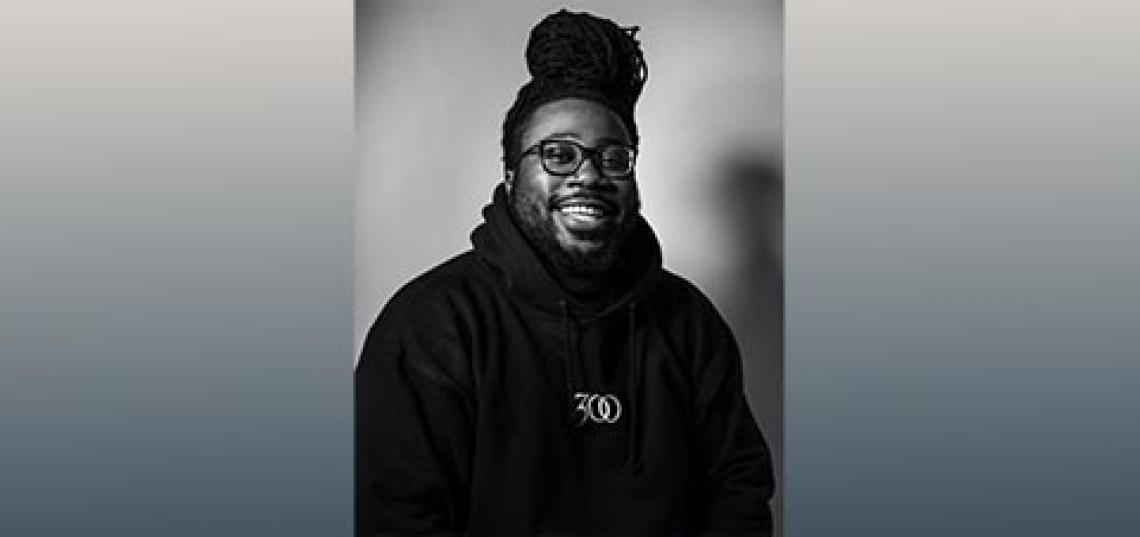
When Emmanuel Maduakolam COM’11 was a SC&I student he landed an internship at XXL Magazine and there he discovered his career passion –to work as a writer in the music industry.
He did achieve his dream – he was hired full-time by XXL Magazine two years after he graduated from Rutgers and worked as a music journalist there. As his interests evolved and expanded, he pursued work as a copywriter and brand creative for HYPEBEAST. Today he is the Lead, Brand Creative Manager, Men’s Performance, at Nike.
While Maduakolam has extensive professional experience, having also worked for Rutgers, BET Networks, and Jive Records, he said his experiences working for XXL Magazine and HYPEBEAST were the most influential job experiences he’s had because they helped him pinpoint the type of work he now finds fulfilling.
“As I've progressed, my focus on what I’ve wanted to do became sharper,” Maduakolam said.
As a Rutgers undergrad, Maduakolam double majored in Communication at SC&I and Africana Studies at the School of Arts and Sciences. He was a member of the Phi Beta Sigma Fraternity, Inc., and the former President of the Black Student Union.
In our Q&A, Maduakolam reminds current students to take advantage of the many resources at SC&I and Rutgers and be open-minded about options when starting out as professionals. “It's about figuring out the things you don't want to do, and then finding that job that allows you to do what you want on a higher level,” he said.
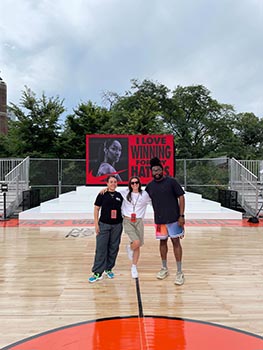 SC&I: You majored in Communication at SC&I. What led you to pursue a career as a creative director/music journalist?
SC&I: You majored in Communication at SC&I. What led you to pursue a career as a creative director/music journalist?
EM: Honestly, a lot of this happens by natural progression. Initially, I was a publicity intern while I was at SC&I from my junior, and senior year, but in between, I did an internship at XXL Magazine that blew my mind open. I did it first in the summer and it opened the doors, ‘wow,’ I thought this is really what I want to do. After working for two years post-college, I got an offer to be a journalist for XXL Magazine. At the time, it was perfect, because I wanted to write about music and share stories that were interesting. Over time, I think what I became more interested in wasn't just sharing stories, it was sharing wider, more interesting stories and topics, dealing with all types of music genres, and that led me to HYPEBEAST. It was great because I got to cover and write about a wider number of musicians while being one of the lead editors for the magazine with a great mentor. Because HYPEBEAST was a unique type of magazine, it did events, pop-ups, and collabs that allowed me to tap into copywriting.
SC&I: Between those two experiences – working for XXL Magazine and HYPEBEAST, did one in particular help you narrow down the type of work you'd want to do in the future?
EM: I think it was narrowing down and further on when I started off at XXL as someone who was interested in writing about music, I then became very interested in telling stories, whether that's through writing or through events. From there, that led me to HYPEBEAST. At the time, the biggest thing that XXL was doing was the freshmen cover, which is where every summer they elect 10 to 11 new artists as the ‘future of hip hop.’ That experience was super exciting because it was a different form of storytelling that interested me. Through that, I went to HYPEBEAST because it was that same type of work and I got interested in building that because of the different types of content. That led me to become a copywriter and led me on the path that I am on now at Nike.
SC&I: Do you feel that the best way to approach your career in general, is by landing opportunities and figuring it out as you go?
EM: I always tell people, the most important thing, especially when you're starting your career, or even at school, is figuring out things you don't want to do. I knew as I was progressing, there were things I didn't want to do anymore. For example, I didn't want to write stories about music news as much or I didn't just want to write profiles. I wanted to open up to copywriting and writing campaigns or think of ways to do storytelling outside of a written form.
"In real life, if you do the bare minimum, you could be fired. Rutgers had professors that cared and would be like, 'Hey, you can be better than this.' I think that's an awesome thing."
SC&I: Do you feel that at Nike you feel like you're doing exactly what you want to do? And do you feel like you're making a difference in your current position as a Brand Creative Narrative Manager there?
EM: For sure. I think the beauty about being at Nike is that you have the ability to make work that travels. And that to me is super important. Because as someone who's been on the other end as a consumer, who's been inspired by the work that Nike has done, that allowed me to think differently, or see things from a new perspective. I'm constantly thinking about that and every day I have a chance to make impactful work. It's a privilege to be in this position and to be able to do that.
SC&I: Is there any advice you would give to a student at SC&I who's looking to do work for a company like Nike or doing a career in music, sports, or pop culture?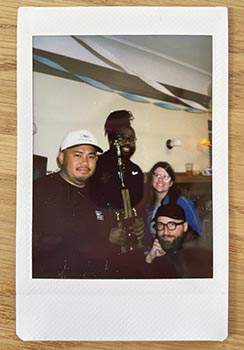
EM: My advice would be to try not to aim for a specific company, but more so try to aim to learn and be the best. I did not have a vision of being at Nike, it just happened. I was concentrating on how I wanted to do certain things better and finding that place that challenged me enough to do that. Nike reached out through a recruiter, and I got the job. I think a lot of the time, it's focusing on the craft and the skills that you are really good at and honing in on that. The right company will then reach out to you or honestly, they will reach out to you if you position your experience and expertise. I think it's all about being the best that you can be in your career.
SC&I: When you talk about being your best, is there any advice that you've received from SC&I staff or faculty that helped you succeed, and be your best in your career?
EM: The craft of writing, it’s so important. The ability to be super sharp and focused on the words that you use and how you use it and the different techniques that you can do, that is super important. That's the thing that I learned most.
There's so many great teachers at SC&I. I think one teacher in particular that was super impactful was Steve Miller. I remember taking his class and it was the first time I'd seen this big personality with so much knowledge and it was great to be in that class and I would sit back and take notes. The skills [I learned] really helped me hone in on the craft of all these different things that can be done. I go back to many of the things I learned in college.
SC&I: Do you feel like Rutgers gave you a lot of motivation to do what you're doing? Do you feel without it, you would have the same motivation in your career?
EM: Rutgers is a truly special school because there are so many amazing professional alumni within the network that you don't even understand, but you realize when you graduate, and you go about your career. There are a lot of Rutgers grads at a lot of awesome places. It fills me with pride when I get to go to a company like Nike and see Rutgers alumni there. It's like ‘wow.’ At the time, we didn't know but the school set us up for success. The school built the foundation for what we are today. I don't know where we'd be if not for Rutgers. It's a perfect balance of higher education, access, and information. Anything you need, you can find it at Rutgers.
You feel like you have a lot of connections with people there. You feel like you have people to fall back on and ask for help and support, which is nice. Whether that's peers, or teachers, or alumni, it's really astounding. Some of my closest friends are from Rutgers, it's a resource that we all tap to. At Nike, there's a bunch of Rutgers folks working there from different graduating classes. It's a great feeling.
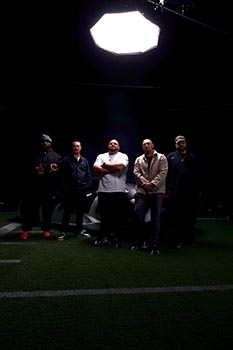 SC&I: What does the future look like for you, beyond Nike? Is there anything that you want to do that you've been wanting to do for a while, on your own?
SC&I: What does the future look like for you, beyond Nike? Is there anything that you want to do that you've been wanting to do for a while, on your own?
EM: I think my simple goal is to create a word that enters the pop culture zeitgeist: it becomes entrenched into our vocabulary, like the term "Nepo baby," or something that's silly. More importantly, I want to help and teach people, especially young BIPOC professionals or students. I think there's a lot of resources and there's a lot of jobs that people don't know about because of lack of visibility. I think that's something that's super important for me. I want to get people to get into marketing and creative work and to become somebody that's huge in their space. Career wise, I really want to be in an ECD one day, an Executive Creative Director at either a brand or a creative agency. I feel like there are not a lot of spaces where diverse thinking and diverse people are accepted wholeheartedly. I think I would love to go to a space where I can make that happen. That's the dream of mine is to ultimately [be in] a space where it's completely diverse in thought and people, making some of the best work out there. I think that's the next thing I’m working towards.
SC&I: Would you say that your secret to success in the industry is thinking outside the box, especially since you do a lot of creative work?
EM: It's a combination of thinking differently, but not just for the fact to be different. I want to do things differently, I try to do things differently, but it's not without reason, per se. That's the secret sauce is being at that intersection where you're open to everything, but you understand that at the end of the day, you're trying to get to a destination with a specific objective. If you understand that, and are open to the diversity of thought, I think that's the secret. And, collaboration-- it's always we versus me. You always have to put the work first, rather than for you personally.
"My advice would be to try not to aim for a specific company, but more so try to aim to learn and be the best. I did not have a vision of being at Nike, it just happened. I was concentrating on how I wanted to do certain things better and finding that place that challenged me enough to do that. Nike reached out through a recruiter, and I got the job."
SC&I: That's such a Rutgers mindset, being open and flexible, but also knowing that you need to get to a set destination. Is there anything else that you'd like to add about Rutgers, SC&I, or any experience that you had with them that has empowered you in your career?
EM: I would say one of my biggest regrets is that when I was at Rutgers, I didn't utilize all the resources, all the teachers that were there, especially now that I'm older, I just did the next thing that I was supposed to do [when I was a student]. There were times where my curiosity took me somewhere, where there's a class or a discussion, an event that broadened my life and piqued my interest. I think that's one of the most important things to do when you're at college. A piece of advice I'd give is don't be bogged down with getting an A. Try to legitimately learn, expand your toolbox, because that speeds everything up. Post-college when you're in your career, it's what you know and who you know. I think if you're doing that as early as possible, especially in the skills area, you have a head start. [Rutgers] has a rich, illustrious faculty, and resources that allow you to become better. I feel that's one of the things I wish I did earlier and probably what I would have done then that I do a lot more now. I think at the beginning of my career, it was finding the things that I was interested in, and absorbing all I could. And I study abroad! There are so many things you can learn outside of your comfort zone.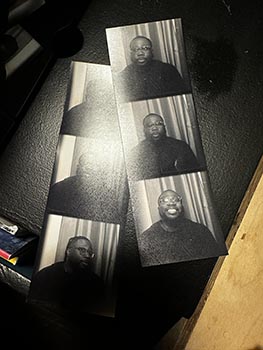
SC&I: What do you feel is the biggest difference between your time at Rutgers and then now, what was one huge change that you observed during the whole process? What was the difference between learning in a classroom and learning concepts in the classroom, but then practically doing work in the field that you're studying?
EM: Responsibility, I think when you're in college, you can do work, you can't do work, and you can probably get by. When you're in the "real world," if you don't do something there's a consequence. If you don't try you can be fired, mess up a project, be overlooked, or underperform. Post-graduate you are a professional. In college it was “I could do this tomorrow," but [professionally] it's always on you. It's your life, your career.
SC&I: Do you feel Rutgers held you accountable?
EM: For sure because the teachers were great. In real life, if you do the bare minimum, you could be fired. Rutgers had professors that cared and would be like, "Hey, you can be better than this." I think that's an awesome thing.
Learn more about the Communication major at the Rutgers School of Communication and Information on the website.
Photos: Courtesy of Emmanuel “Manny” Maduakolam COM ‘11
Photo captions, top to bottom:
- Two of my teammates and I who created the Victory Park activation to actualize Nike’s newest campaign ‘Winning Isn’t For Everyone’ that launched during the Olympics. For North America, we wanted to convey what winning basketball looked like by building a coliseum for NYC basketball.
- Post creative shoot joys in Chicago with Very Taste production team. We shot a campaign for Nike’s Full Force shoe launch. The trophy was a set piece.
- Creative and Marketing team family photo after shooting Deion Sanders and his sons on set at the University of Colorado.
- Solo photo booth capture of me in Portland about to head on campus to celebrate SNKRBall 2024, the premiere event of The Black Employee Network & Friends (BEN), an ERG org that I was a co-lead creative and communications leadership member for.
